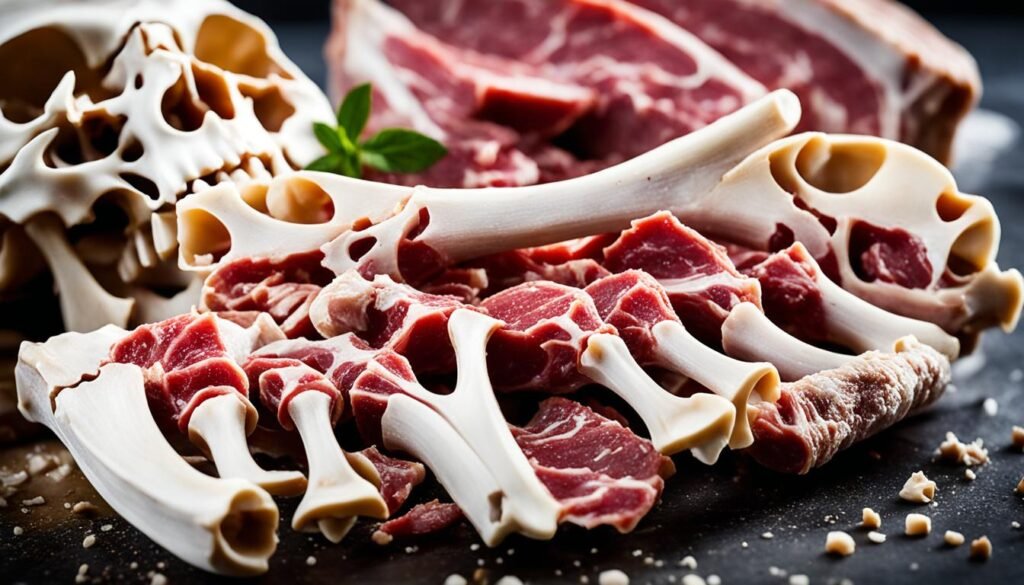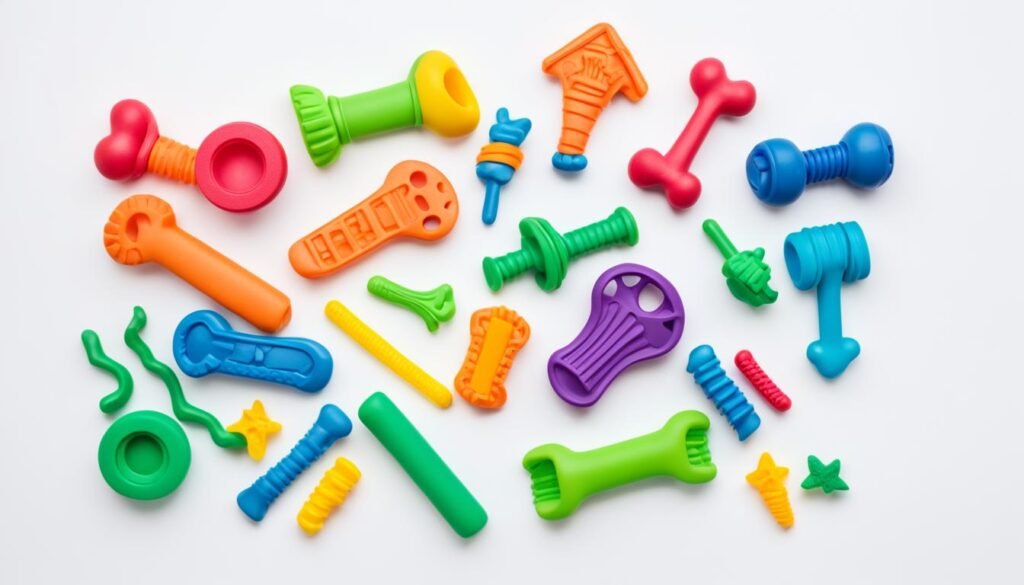As a proud Rottweiler owner, I understand the importance of providing our furry friends with a balanced and nutritious diet. When it comes to feeding Rottweiler puppies, many pet owners wonder if bones should be a part of their meal plan. In this article, I will explore the topic of bone consumption for Rottweiler puppies and offer my advice on whether it is safe and beneficial.
Feeding bones to Rottweiler puppies is a popular practice among dog owners. It is believed that bones offer essential minerals and nutrients, satisfy their innate chewing instincts, and promote dental health. However, it is crucial to be aware of the potential hazards associated with feeding bones to puppies.
Cooked bones, such as those from your dinner leftovers, can splinter and cause severe damage to a puppy’s mouth, throat, or intestines. Fatty bones, like pork rib bones, can lead to pancreatitis, a painful and potentially life-threatening condition. Additionally, chewing bones can result in choking hazards and blockages in the intestines, leading to further complications. To ensure the safety and well-being of your Rottweiler puppy, it is essential to consult with a veterinarian before introducing bones into their diet.
Key Takeaways:
- Feeding bones to Rottweiler puppies can pose serious health risks, including splintering, choking, blockages, and pancreatitis.
- Consulting with a veterinarian is crucial before introducing bones into your puppy’s diet.
- Cooked bones and fatty bones should be avoided altogether due to their potential dangers.
- Supervise your puppy while chewing bones, and choose appropriate-sized bones to prevent choking hazards.
- Consider safer alternatives such as chew toys and nutritionally balanced diets approved by veterinary professionals.
Potential Health Hazards of Feeding Bones to Rottweiler Puppies
Feeding bones to Rottweiler puppies can pose various potential health hazards. It’s important to be aware of these risks to ensure the well-being of your furry friend.
Fatty bones:
Fatty bones, like pork rib bones, can be hazardous for Rottweiler puppies. Consuming fatty bones can lead to pancreatitis, a condition that causes inflammation of the pancreas. This can result in symptoms such as vomiting, lethargy, diarrhea, and loss of appetite.
Cooked bones:
Another potential hazard is feeding cooked bones to Rottweiler puppies. Cooked bones can splinter into sharp shards, posing a choking and injury risk. These bone fragments can cause serious damage to your puppy’s mouth, throat, or intestines.
Blockages:
Chewing on bones can also lead to blockages in the intestines. Bone fragments may get stuck, causing severe illness or even death. It’s crucial to monitor your puppy while they chew on bones and ensure they don’t swallow any large pieces.
Stomach irritation:
Feeding bones can irritate your puppy’s stomach, leading to digestive issues such as diarrhea. It’s important to be cautious and observe any changes in your puppy’s digestion after they consume bones.
Considering these potential health hazards, it’s recommended to consult with your veterinarian before feeding bones to your Rottweiler puppy. They can provide you with personalized advice based on your puppy’s health and specific dietary needs.
Considerations When Offering Bones to Rottweiler Puppies

If you’re considering giving bones to Rottweiler puppies, there are several important considerations to keep in mind. While some veterinarians may recommend raw meat bones, it’s essential to be aware that they can carry bacteria like salmonella. Therefore, it’s crucial to prioritize your puppy’s safety and practice proper supervision when they chew on bones.
When selecting bones for your Rottweiler puppy, choose ones that are appropriate in size. Bones should be larger than the length of their muzzle to prevent swallowing and potential choking hazards. This ensures a safe chewing experience for your puppy.
It’s also important to limit the duration of bone chewing to prevent excessive consumption. After a few minutes of chewing, refrigerate the bone to discourage overconsumption and maintain control over their bone intake. By doing so, you can prevent any potential digestive issues that may arise from consuming too much bone material.
Proper bone disposal is another crucial consideration. After a few days, dispose of the bone to avoid bacterial growth and potential intestinal issues. This ensures a clean and hygienic environment for your Rottweiler puppy.
Key Considerations:
- Choose raw meat bones with caution due to potential bacteria contamination
- Supervise your puppy while they chew bones to ensure their safety
- Select bones that are appropriate in size to prevent swallowing
- Limit the duration of bone chewing to prevent excessive consumption
- Refrigerate the bone after a few minutes to discourage overconsumption
- Dispose of bones after a few days to prevent bacterial growth and potential intestinal issues
By carefully considering these factors, you can provide a safe and enjoyable bone-chewing experience for your Rottweiler puppy while minimizing any potential risks.
Alternatives to Feeding Bones to Rottweiler Puppies

If you’re concerned about the risks associated with feeding bones to Rottweiler puppies, there are alternative options available. Instead of bones, you can consider providing them with bone alternatives such as chew toys. These toys not only provide mental stimulation but also promote dental health by helping to remove plaque and tartar buildup.
Regular teeth brushing is also essential for maintaining good dental hygiene. Brushing your puppy’s teeth regularly can help prevent dental diseases and keep their teeth clean and healthy. Additionally, there are dental diets, treats, and chews approved by the Veterinary Oral Health Council (VOHC) that can aid in maintaining their dental health.
Furthermore, a nutritionally balanced diet plays a crucial role in your puppy’s overall health and well-being. Commercially available dog food brands provide specially formulated diets that meet the nutritional requirements of Rottweiler puppies. These diets ensure that your puppy receives all the necessary nutrients for their growth and development.
Conclusion
Feeding bones to Rottweiler puppies can be a topic of debate among pet owners. While bones may offer potential benefits, it’s crucial to prioritize the safety and well-being of your furry friend. There are inherent risks and potential hazards associated with bone consumption, such as choking, digestive blockages, and stomach irritations.
To ensure the bone safety of your Rottweiler puppy, consulting with a veterinarian is essential. They can provide expert advice tailored to your puppy’s specific needs and guide you on whether or not bones are suitable treats for them. Your veterinarian will consider factors such as your puppy’s age, dental health, and any underlying health conditions.
Consider exploring safer alternatives like chew toys, which offer mental stimulation and promote dental health while eliminating the risks associated with bones. Additionally, nutritionally balanced diets recommended by your veterinarian provide all the necessary nutrients for your puppy’s overall health and well-being.
When it comes to bone safety for Rottweiler puppies, seeking professional advice and making informed decisions is key. Remember to consult with your veterinarian to ensure you are providing the best care and nutrition for your beloved Rottweiler puppy.
FAQ
Can Rottweiler puppies eat bones?
Feeding bones to Rottweiler puppies is a common practice, but it is important to be aware of the potential hazards associated with it. Consult with a veterinarian before giving bones to Rottweiler puppies.
What are the potential health hazards of feeding bones to Rottweiler puppies?
Feeding bones to Rottweiler puppies can pose risks such as pancreatitis from fatty bones, choking and injury from splintered cooked bones, and blockages and stomach irritations from bone fragments.
What considerations should I have when offering bones to Rottweiler puppies?
When offering bones to Rottweiler puppies, consider supervising them, choosing appropriate bone sizes, limiting chewing duration, refrigerating bones, and disposing of bones after a few days to ensure safety and avoid overconsumption.
What are the alternatives to feeding bones to Rottweiler puppies?
Alternatives to feeding bones to Rottweiler puppies include using chew toys, promoting dental health with teeth brushing and dental diets, treats, and chews approved by the Veterinary Oral Health Council (VOHC), and providing nutritionally balanced diets.
What is the conclusion regarding feeding bones to Rottweiler puppies?
Feeding bones to Rottweiler puppies can have potential benefits but also carries risks and potential hazards. Consult with a veterinarian for advice tailored to your puppy’s specific needs to ensure their overall health and well-being.
